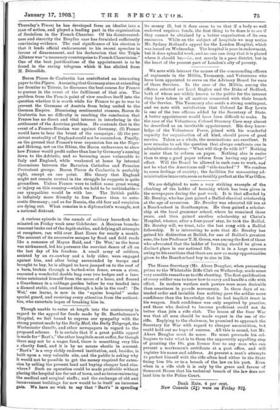Baron Pierre de Coubertin has contributed an interesting paper to
the Figaro. Assuming that Germany aims at extending her frontier to Trieste, he discusses the best course for France to pursue in the event of the fulfilment of that aim. The problem from the French point of view resolves itself into the question whether it is worth while for France to go to war to prevent the Germans of Austria from being united to the German Empire. Dismissing sentimental reasons, Baron de Coubertin has no difficulty in reaching the conclusion that France has no direct and vital interest in interfering in the settlement of the Austrian problem. He contends that in the event of a Franco-Russian war against Germany, (1) France would have to bear the brunt of the campaign ; (2) the per- sistent neutrality of England could not be counted on. Finally, on the ground that France's true expansion lies on the Niger and Mekong, not on the Rhine, the Baron endeavours to show how France would profit rather than lose by Germany's coming down to the Adriatic, and so becoming more vulnerable to Italy and England, while weakened at home by internal dissensions between the Bavarian Catholics and Prussian Protestant groups. Baron Pierre de Coubertin is probably right, except on one point. His theory that England might not remain neutral in the struggle he suggests is quite groundless. Unless France were to inflict some great wrong or injury on this country—which we hold to be unthinkable— our sympathies would be with her. The British public is infinitely more friendly to free France than to auto- cratic Germany ; and as for Russia, the old fear and suspicion are dying out. What remains is a diplomatist's wrangle, not a national distrust










































 Previous page
Previous page